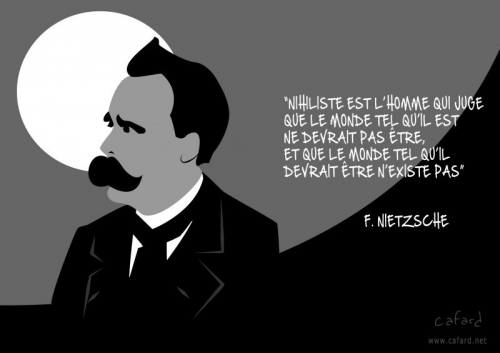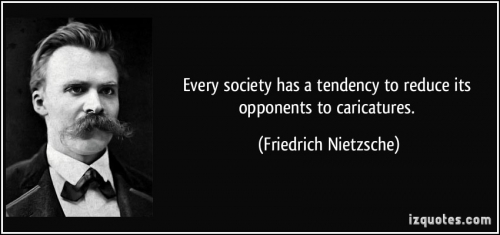mercredi, 25 mars 2015
Heidegger on Nietzsche, Metaphysics, & Nihilism

Heidegger on Nietzsche, Metaphysics, & Nihilism
By Greg Johnson
Ex: http://www.counter-currents.com
Heidegger’s central philosophical topic has a number of names: the sense (Sinn) or meaning of Being, the truth (Wahrheit) of Being, the clearing (Lichtung) of Being, the “It” that “gives” Being, and the “Ereignis” (“event” or “appropriation”) of Being, referring to the mutual belonging of man and Being.[1] All of these words refer to that-which-gives and that-which-takes-away different “epochs” in the history of Being, which are comprehensive, pervasive, and fundamental ways of interpreting the world and our place in it.
Heidegger’s topic is shrouded in mystery, for that-which-gives each epoch in the history of Being is hidden by the very epoch that it makes possible. This mystery is built right into the dual meanings of Heidegger’s names for his topic.
The word “Lichtung” refers both to Being (that which lights up beings) and also to the clearing that makes it possible for the light to illuminate beings—and the light attracts our attention to itself while leaving the clearing that makes it possible in darkness. The “it” that gives Being is hidden behind Being, its gift. Ereignis is the mutual belonging of man and Being, in which man in enthralled by the world opened up by the event and thus oblivious to the event itself. Heidegger even hears the mystery of Being in the word “epoch,” which refers both to the historical spans of particular dominant ways of interpreting the world, and, when heard in the Greek as “epoche,” refers to the withholding of that which grants the epochs, the giver that hides behind its gift.
Now we are in the position to begin to think through the connection that Heidegger draws between metaphysics and nihilism. Heidegger’s thesis is that nihilism is the consummation of Western metaphysics. To this end, I wish to comment on one of my favorite texts by Heidegger, the two lectures entitled “The Eternal Recurrence of the Same and the Will to Power.” These lectures beautifully epitomize Heidegger’s vast two-volume work on Nietzsche, and they gather together and display the unity of themes discussed by Heidegger over a period of more than 50 years.
Heidegger’s thesis is that “Nietzsche’s philosophy is the consummation of Western metaphysics.”[1] For Heidegger, Nietzsche’s philosophy represents the epitome of modern nihilism, the ultimate manifestation of the nihilistic impulse built into Western metaphysics from the very beginning. Heidegger’s thesis that Nietzsche is the last metaphysician of the West is a stunning thesis, a thesis very difficult to defend, for Nietzsche is widely regarded as the first post-metaphysical thinker, not the last and ultimate metaphysical thinker.
Traditional metaphysics is constructed around the dualisms of permanence and change and of appearance and reality. The permanent is identified with Being, which is said to be a reality that lies beyond the world of appearances, the world of change, the realm of becoming. Nietzsche seems to overcome these dualisms by collapsing the distinctions between permanence and change, appearance and reality, Being and becoming. Therefore, Nietzsche seems to go beyond metaphysics.
How, then, does Heidegger establish Nietzsche as the last metaphysician of the West? Another way of putting this question is: How does Heidegger establish that Nietzsche’s attempt to overcome metaphysics is a failure? What does Heidegger think that a genuine overcoming of metaphysics requires?
Nietzsche’s Metaphysics
When Heidegger uses the word “metaphysics” pejoratively, he refers to the metaphysics of presence: “These positions take the Being of beings as having been determined in the sense of permanence of presence” (p. 162). Another word for the metaphysics of presence in the Heidegger lexicon is “Platonism.” Platonism is a view that cannot necessarily be identified with Plato’s own views. Platonism, rather, is the pervasive interpretation of Plato’s views in the tradition. Platonism identifies Being with permanence as opposed to change, presence as opposed to absence, identity as opposed to difference.
The latter terms of these pairs—change, absence, difference—are identified with non-being. In the world around us, rest and motion, presence and absence, identity and difference are all mixed together.
Thus the Platonist concludes that this world is not the true world; it is not the realm of Being, but the realm of becoming, which is a mere blurred image or decayed manifestation of Being. Becoming is merely a veil of appearances which cloaks and hides that which is real, namely Being.
The Platonic realm of Being is identified as the place of forms or essences. The world of becoming is the world in which we find individual men, individual dogs, individual chairs, individual tables. All of these individuals come into being, change, and pass out of existence. The world of Being contains not individual men, but the essence of man, or “manhood.” It does not contain individual dogs, but the essence of dog, “doghood.”
Forms or essences, unlike individuals, do not come into being; they do not change; and they do not pass away. While particulars that become exist in time, forms of essences exist outside of time in eternity. Because particulars in time are infected with change, absence and difference, we cannot have certain knowledge of them; at best, we can have only tentative opinions about things in the world around us. We can have certain knowledge only of the forms or essences that make up the realm of Being.

Heidegger holds that the metaphysics of presence—the interpretation of Being as presence—and also the Platonic distinction between the world of Being and the world of becoming is retained in Nietzsche’s allegedly post-metaphysical doctrines of the Will to Power and the Eternal Recurrence of the Same. What is the Will to Power? And what is the Eternal Recurrence of the Same?
Nietzsche called the ultimate constituent of the world Will to Power. This is a highly anthropomorphized name for something that is neither a will (for there is no agent behind it that wills); nor is it “to power” (for it is not directed toward the goal of power, or any other goal). Will to Power is Nietzsche’s name for chaos, which he conceived of as a virtual infinity of points of force charging and discharging entirely without pattern or purpose. Heidegger defines the “Will to Power” as “the essence of power itself. It consists in power’s overpowering, that is, its self-enhancement to the highest possible degree” (p. 163).
The Will to Power is the constant exercise of power as an end in itself.
The Will to Power makes possible the constant exercise of power by positing limits for itself and then exceeding them; Will to Power first freezes itself into particular forms and then overcomes and dissolves them.
The Will to Power is Nietzsche’s account of what the world is.
The Eternal Recurrence of the Same is a concept derived from the ancient Epicureans and Stoics. Both the Stoics and Epicureans believed that the cosmos is finite. The cosmos consists of matter and void, and there is only so much matter and so much void. Matter, however, is not fully inert. Matter has both inert and animate dimensions. Matter has the tendency to remain at rest or in motion, which the Epicureans represented by matter falling through the void. But matter also has a non-inert aspect that causes it to swerve from its fall or to move from rest to motion by its own power. The Epicureans represented this aspect of matter as the famous “clinamen” or “swerve” of the atoms. The Stoics represented this as divine logos, which following Heraclitus, they represented as fire. Matter, in short, is in some sense vital and animate; it is alive and ensouled. Matter’s vital principle allows order to form out of chaos. Matter’s inert dimension allows order to dissolve back into chaos.
Given a finite amount of matter and a finite void, given that matter has both a tendency to give rise to order and dissolve order, and given that time is infinite, the Epicureans and Stoics argued that the random play of chaos within a finite cosmos over an infinite amount of time not only gives rise to order, but gives rise to the same order an infinite number of times. Everything that is happening now has already happened an infinite number of times before and will happen an infinite number of times in the future. The Same events will Recur Eternally, hence the Eternal Recurrence of the Same. As Woody Allen once put it, “Eternal Recurrence of the Same. Does that mean I’ll have to sit through the Ice Capades again?” And the answer is: “Yes.” Not only will he have to sit through it again an infinite number of times, he already has sat through it an infinite number of times. It’s deja-vu all over again.
Nietzsche takes this argument over completely. The Will to Power corresponds precisely to the two aspects of matter discussed by the Epicureans and Stoics.
The animate aspect of matter that gives rise to form and organization corresponds to the Will to Power’s tendency to posit order.
The inert aspect of matter that causes form and organization to dissolve back into chaos corresponds to the Will to Power’s tendency to overpower and dissolve the very order that it posits.

Nietzsche holds that the Will to Power is finite and that time is infinite. Given the possibility of endlessly rearranging a finite Will to Power over an infinite amount of time, the same kinds of order will inevitably repeat themselves, and they will repeat themselves and infinite number of times: Eternal Recurrence of the Same.
Just as Will to Power is Nietzsche’s account of what the world is, The Eternal Recurrence of the Same is Nietzsche’s account of how the world is.
Nietzsche claims to have abolished metaphysics because he abolishes the dualism between appearance and reality, Being and becoming, presence and absence, identity and difference, etc. All of these pairs of opposites are found blended together in the Will to Power and the Eternal Recurrence of the Same. There is no realm of pure presence, pristine identity, total rest, and separate essences, lying behind the world that appears to us.
Heidegger’s critique of this claim is twofold. First, he argues that the basic elements of Platonism are still at work in Nietzsche. Second, he argues that Nietzsche really does not understand what it would take to overcome metaphysics.
How is Nietzsche a Metaphysician?
Heidegger argues that Nietzsche’s doctrines of Eternal Recurrence and Will to Power are metaphysical in two ways. First, the accounts of Eternal Recurrence and Will to Power still buy into the metaphysics of presence. As Heidegger puts it:
“Recurrence” thinks the permanentizing of what becomes, thinks it to the point where the becoming of what becomes is secured in the duration of its becoming. The “eternal” links the permanentizing of such constancy in the direction of its circling back into itself and forward toward itself. What becomes is not the unceasing otherness of an endlessly changing manifold. What becomes is the same itself, and that means the one and selfsame (the identical) that in each case is within the difference of the other. . . . Nietzsche’s thought thinks the constant permanentizing of the becoming of whatever becomes into the only kind of presence there is–the self-recapitulation of the identical. (pp. 164–65)
Elsewhere, Heidegger writes:
Will to Power may now be conceived of as the permanentizing of surpassment, that is of becoming; hence as a transformed determination of the guiding metaphysical projection. The Eternal Recurrence of the Same unfurls and displays its essence, so to speak, as the most constant permanentizing of the becoming of what is constant. (p. 167)
Will to Power and the Eternal Recurrence of the Same, in short, think Being in terms of presence too, by making becoming itself permanent, by making becoming recapitulate the identical, by making the motion of becoming circular, thus bringing a kind of eternity into time itself.
The second way in which Heidegger argues that Nietzsche is a metaphysician is somewhat more elusive and difficult. Heidegger writes on page 168:
From the outset, the Eternal Recurrence of the Same and Will to Power are grasped as fundamental determinations of beings as such and as a whole—Will to Power as the peculiar coinage of “what-being” . . . and Eternal Recurrence of the Same as the coinage of “that-being.”
Heidegger claims that this distinction is “co-extensive” with the basic distinction that defines and sustains metaphysics. “What-being” or “whatness” refers to the identity of beings. “What-being” or “thatness” refers to the existence of beings. To talk about the identity of a thing is to talk about what it is in contrast to the identity of different things, the things that it is not. When we talk about the existence of something, we are talking about the fact that it is, as opposed to the idea of its non-existence.
Now, in Platonism, the identity of a particular being is endowed by its form. A particular dog has its identity as a dog because it is related to the Form of dog, or “dogness.” A particular man has his identity as a man because he is related somehow to the essence of man, or “manhood.” A particular dog has his existence as a concrete individual dog because a bit of the material world has been informed by the essence of dog. So, for Platonism, the identity or whatness of a particular being is explained by its essence and its individual existence or thatness is explained by its materiality.
Heidegger holds that this Platonic distinction is present in the distinction between the Will to Power and the Eternal Recurrence of the Same. Will to Power names the whatness or identity of all beings. Therefore, it corresponds to the Platonic form. Eternal Recurrence names the thatness or existence of beings. Therefore, it corresponds to the instantiation of the Platonic Form in a bit of the spatio-temporal world. Will to Power is the principle of identity. Eternal Recurrence is the principle of existence. This dualism, Heidegger claims, is not overcome by Nietzsche, so Nietzsche does not overcome metaphysics.
Indeed, Heidegger claims that Nietzsche represents the culmination of metaphysics. To understand this, we must understand how, precisely, Nietzsche fails to overcome metaphysics. And to understand this, we need to know what Heidegger thinks a genuine overcoming of metaphysics would require.
What Constitutes a True Overcoming of Metaphysics?
Heidegger thinks that a genuine overcoming of metaphysics requires that we think his distinctive topic, the distinctive matter of his thinking: that which gives and that which takes away the different epochs of the history of Being. It requires that we think the Truth of being, the Meaning of Being, the Clearing of Being, the Event of Being, etc. Heidegger mentions his distinctive topic in a number of places in these lectures:
It first appears on page 164 (second paragraph):
What this unleashing of power to its essence is [i.e., that which grants the interpretation of Being as Will to Power], Nietzsche is unable to think. Nor can any metaphysics think it, inasmuch as metaphysics cannot put the matter [die Sache, the topic] into question.
It also appears on page 165 (second paragraph):
This “selfsame” [Being interpreted as Eternal Recurrence] is separated as by an abyss from the singularity of the unrepeatable enjoining of all that coheres. Out of that enjoining alone does the difference commence.
Here Heidegger contrasts Nietzsche’s metaphysics of history (which encloses becoming in the circle of Being through the idea of the eternal recurrence of the same) with his own view of the history of Being as a sequence of unrepeatable contingent singularities in which new epochs in the history of Being displace one another.

One can ask, however, if Heidegger himself does not ultimately subscribe to a kind of cyclical history, since he seems to believe that (1) the pre-Socratic Greek sense of Being as the dynamic interplay of presence and absence is correct, even though it overlooked the conditions of its own emergence, and (2) that it is possible to return to this correct interpretation of Being, either (a) reflectively, with an appreciation of its importance in the light of the subsequent tradition, or (b) naively, though the liquidation of the present civilization and a return to barbarism, which may be the meaning of Heidegger’s famous claim that “only a god can save us now,” meaning a return to naive belief.
Heidegger’s topic shows up again in the very next paragraph:
Thought concerning truth, in the sense of the essence of aletheia, whose essential advent sustains Being and allows it to be sheltered in its belonging to the commencement, is more remote than ever in this last projection of beingness.
Here aletheia refers to that which both grants a new epoch in the history of Being and shelters its advent in mystery.
There is also an extensive discussion of the topic from the bottom of page 166 throughout the entirety of page 167.
Heidegger claims that Nietzsche does not overcome metaphysics because the overcoming of metaphysics requires that one think that which grants different epochs in the history of Being and Nietzsche does not think this topic. Heidegger adds, furthermore, that Nietzsche not only fails to overcome metaphysics, he actually make this overcoming more difficult because he fosters the illusion that metaphysics is already overcome, thereby enforcing our oblivion to that which grants metaphysics, thereby making us less likely to think this topic and thus to effect a genuine overcoming of metaphysics. As Heidegger writes on 166:
Inadequate interrogation of the meaning of Nietzsche’s doctrine of Return, when viewed in terms of the history of metaphysics, shunts aside the most intrinsic need that is exhibited in the history of Western thought [i.e., the need to think that which grant metaphysics]. It thus confirms, by assisting those machinations that are oblivious to Being, the utter abandonment of Being.
It is at this point that we can understand why Heidegger thinks that Nietzsche is not only a metaphysician, but the culmination of metaphysics. Metaphysics thinks the Being of beings, but does not think the meaning of Being, the clearing of Being, etc. Nietzsche is the culmination of metaphysics because Nietzsche’s metaphysics not only fails to think that which grants Being, but actually makes this altogether impossible because it fosters the illusion that metaphysics has been finally overcome.
A further reason for regarding Nietzsche as the culmination of metaphysics can be appreciated by examining Heidegger’s definition of nihilism. Heidegger defines the modern technological age, the age of nihilism as “the age of consummate meaninglessness” (p. 174). Consummate meaninglessness is equivalent to the interpretation of Being in terms of man’s own subjective needs: Being as certainty; Being as intelligibility; Being as availability and deployability for human purposes. The world is meaningless because wherever we look, we only encounter projections of our own overweening subjectivity and will to power. The essence of modernity is the idea that everything can be understood and controlled.
This view of the world is made possible by our failure to think about what grants it, what makes it possible, the source of this epoch in the history of Being. Heidegger claims that we cannot understand the origin of the idea that we can understand everything. We cannot control the emergence of the idea that we can control everything. Trying to understand the origins of nihilism forces us to recognize that there is a mystery that cannot be explained or controlled. And this encounter with mystery is alone sufficient to break the spell that everything can be understood and controlled. It is thus a real overcoming of metaphysics and of its culmination in the nihilism of technological modernity.
Notes
1. See my essay “Heidegger’s Question Beyond Being,” http://www.counter-currents.com/2014/10/heideggers-question-beyond-being/ [4]
2. Martin Heidegger, Nietzsche, vol. III: The Will to Power as Knowledge and as Metaphysics, ed. David Farrell Krell, trans. Joan Stambaugh, David Farrell Krell, and Frank A. Capuzzi (New York: Harper and Row, 1987), p. 161.
Article printed from Counter-Currents Publishing: http://www.counter-currents.com
URL to article: http://www.counter-currents.com/2015/03/heidegger-on-nietzsche-metaphysics-and-nihilism/
URLs in this post:
[1] Image: http://www.counter-currents.com/wp-content/uploads/2015/03/bythesea.jpg
[2] Image: http://www.counter-currents.com/wp-content/uploads/2012/09/NietzscheSeated.jpg
[3] Image: http://www.counter-currents.com/wp-content/uploads/2014/09/heidegger-crop.jpg
[4] http://www.counter-currents.com/2014/10/heideggers-question-beyond-being/ : http://www.counter-currents.com/2014/10/heideggers-question-beyond-being/
00:05 Publié dans Philosophie | Lien permanent | Commentaires (0) | Tags : nietzsche, friedrich nietzsche, heidegger, martin heidegger, philosophie, métaphysique, nihilisme |  |
|  del.icio.us |
del.icio.us |  |
|  Digg |
Digg | ![]() Facebook
Facebook



Les commentaires sont fermés.